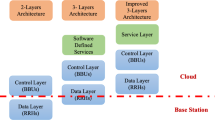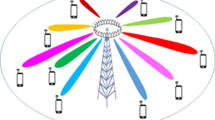Abstract
In this paper, we propose a low-complexity beamforming-based scheduling scheme utilizing a semi-orthogonal user selection (SUS) algorithm in downlink orthogonal frequency division multiple access (OFDMA)/space division multiple access (SDMA) systems to support multimedia traffic. One of the challenges in the multi-dimensional (space, time, and frequency) radio resource allocation problem for OFDMA/SDMA systems is its high complexity, especially to simultaneously satisfy the quality of services (QoS) requirements for various traffic classes. In the literature, the SUS algorithm is usually applied to the single-class traffic environment, but extending the SUS algorithm to the multimedia environment is not straightforward because of the need to prioritize the real-time (RT) users and the non-real-time (NRT) users. To solve this problem, we propose the concept of urgency value to guarantee the fairness of the NRT as well as the best effort (BE) users while satisfying the delay requirement for the RT users. Simulation results show that, when traffic load is greater than 0.5, the proposed scheduling algorithm can improve the fairness performance by more than 100% over the most recently proposed algorithms.






Similar content being viewed by others
References
Lau, V. K. N. (2005). Optimal downlink space-time scheduling design with convex utility functions-multiple-antenna systems with orthogonal spatial multiplexing. IEEE Transations on Vehicular Technology, 54(4), 1322V1333.
Tsai, C.-F., Chang, C.-J., Ren, F.-C., & Yen, C.-M. (2008). Adaptive radio resource allocation for downlink OFDMA/SDMA systems with multimedia traffic. IEEE Transactions on Wireless Communications, 7(5), 1734–1743.
Koutsopoulos I., & Tassiulas, L. (2008). The impact of space division multiplexing on resource allocation: A unified treatment of TDMA, OFDMA and CDMA. IEEE Transactions on Communications, 56(2), 260–269.
Xu, H., Tian, H., Feng, Y., Gao, Y., & Zhang, P. (2008). An efficient resource management scheme with Guaranteed QoS of heterogeneous services in MIMO-OFDM system. In Proceedings of IEEE WCNC’08, NV. pp. 1838–1843.
Tsang, Y. M., & Cheng, R. S. (2004). Optimal resource allocation in SDMA/muilti-input-single-output/OFDM systems under QoS and power constraints. In Proceedings of IEEE WCNC’08, GA. pp. 1595–1600.
Maciel, T. F., & Klein, A. (2007). A resource allocation strategy for SDMA/OFDMA systems. In Proceedings of IEEE ISTMWC’07, Budapest, Hungary.
Kim, H., & Han, Y. (2005). A proportional fair scheduling for multicarrier transmission systems. IEEE Communications Letters, 9(3), 210–212.
Nguyen, T.-D., & Han, Y. (2006). A proportional fairness algorithm with QoS provision in downlink OFDMA systems. IEEE Communications Letters, 10(11), 760–762.
Thoen, S., Perre, L. V., Engels, M., & Man, H. D. (2002). Adaptive loading for OFDM/SDMA-based wireless networks. IEEE Transactions on Communications, 50(11), 1798–1810.
Radunovic, B., & Le Boudec, J.-Y. (2007). A unified framework for max-min and min-max fairness with applications. IEEE/ACM Transactions on Networking, 15(5), 1073–1083.
Cheng, R.-G., Chang, C.-J., Shih, C.-Y., & Chen, Y.-S. (2006). A new scheme to achieve weighted fairness for WLAN supporting multimedia services. IEEE Transactions on Wireless Communications, 5(5), 1095–1102.
Banchs, A. (2002). User fair queuing: Fair allocation of bandwidth for users. In Proceedings of IEEE INFCOM’02, NY. pp. 1668–1677.
Song, X., Hu, N., He, Z., Niu, K., Wang, X., & Wu, W. (2007). A cross-layer design for downlink scheduling in SDMA packet access networks. In Proceedings of IEEE 65th VTC, Dublin, Ireland. pp. 1016–1020.
Kim, J., Part, S., Lee, J. H., Lee, J., & Jumg, H. (2005). A scheduling algorithm combined with zero-forcing beamforming for a multiuser MIMO wireless system. In Proceedings of IEEE 62nd VTC, TX. pp. 211–215. .
Yoo, T., & Goldsmith, A., (2006). On the optimality of multiantenna broadcast scheduling using zero-forcing beamforming. IEEE Journal on Selected Areas in Communications, 24(3), 528–541.
Swannack, C., Uysal-Biyikoglu, E., & Wornell, G.W. (2004). Low complexity multiuser scheduling for maximizing throughput in the MIMO broadcast channel. In Proceedings of Allerton Conference on Communications, Control and Computer, 756–765.
Shen, M., Li, G., & Liu, H. (2005). Effective of traffic channel configuration on the orthogonal frequency division multiple access downlink performance. IEEE Transaction on Wireless Communications, 4(4), 1901–1913.
IEEE 802.16-2004. (2004). “IEEE Standard for local and metropolitan area networks-part 16: Air interface for fixed broadband wireless access systems.”
Yaghoobi, H. (2004). Scalable OFDMA physical layer in IEEE 802.16 WirelessMAN. Intel Techonology Journal, 8(3), 201–212.
3GPP TR 25.892. (Jun. 2004). “3GPP Technical Report for feasibility study for OFDM for UTRAN enhancement.”
IEEE 802.16.3c-01/29r3. (2001). “Channel models for fixed wireless application.”
WiMAX forum V.2.0. (Dec. 2007). “WiMAX Technical Report for Wimax system evaluation methodology.”
Acknowledgments
This work was supported by the National Science Council of Taiwan, ROC, under contract number NSC 96-2628-E-009-004-MY3, NSC 97-2221-E-009-098-MY3, NSC 97-2221-E-009-099-MY3, and the Ministry of Education under the ATU plan.
Author information
Authors and Affiliations
Corresponding author
Additional information
The original version of this paper was presented at IEEE GLOBECOM 2009, Honolulu, Hawaii, USA, Nov. 30–Dec. 4, 2009.
Rights and permissions
About this article
Cite this article
Chung, WC., Wang, LC. & Chang, CJ. A low-complexity beamforming-based scheduling to downlink OFDMA/SDMA systems with multimedia traffic. Wireless Netw 17, 611–620 (2011). https://doi.org/10.1007/s11276-010-0300-0
Published:
Issue Date:
DOI: https://doi.org/10.1007/s11276-010-0300-0




